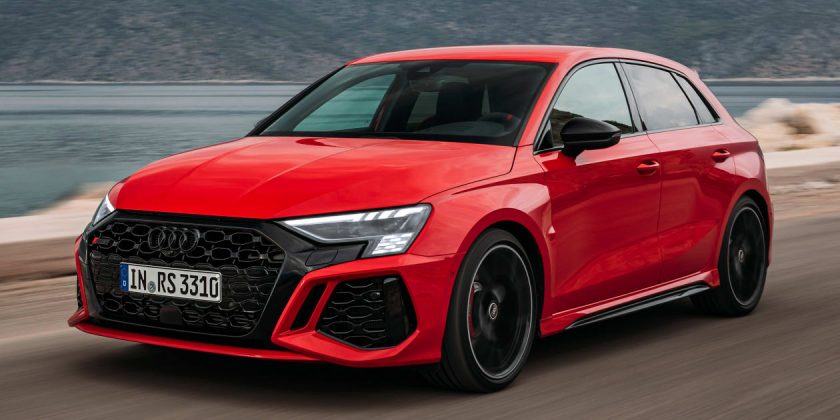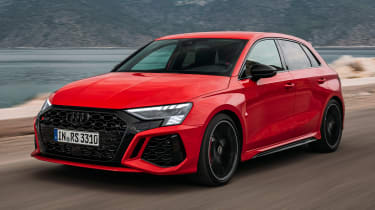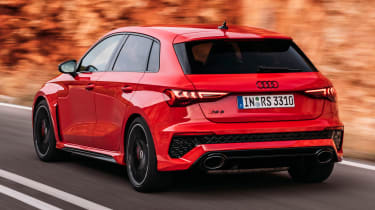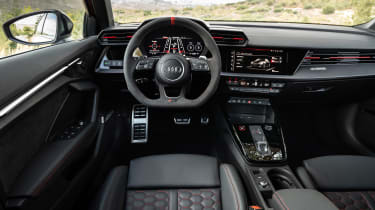The new 395bhp Audi RS 3 hot hatch offers the perfect blend of speed, comfort and usability
4.5 out of 5
Buy used for less at Buyacar
Verdict
With the new RS 3 Audi has created the fastest hot hatchback money can buy. While the drivetrain tech doesn’t deliver the purest of driving experiences, there’s more sophistication than in previous generations, and the incredible performance on offer isn’t in doubt – plus that five-cylinder engine adds real character. Few cars on sale can deliver such devastating any-weather pace, and despite this huge capability, it’s still comfortable, refined, and easy to live with every day.
When the automotive landscape becomes fully dominated by electric vehicles, there will be a handful of internal combustion engines that we’ll miss the most. Among the finest V12s and screaming flat sixes found in supercars and GTs, the five-cylinder turbocharged unit in the new Audi RS 3 Sportback, one of the most potent hot hatches ever made, will deserve a place on that list.
Maximum power in this new RS 3 matches the outgoing car at 395bhp, but it reaches that figure 200rpm sooner, and continues all the way to 7,000rpm. Torque climbs 20Nm to 500Nm, and is available from 2,250rpm right the way though to 5,600rpm.
Best hot hatchbacks 2021
- BMW M2 Competition vs Audi RS 3 Saloon
- Audi RS 3 review
- Long-term test review: Audi RS 3
- New Audi RS 3 Sportback 2019 review
- New Audi RS 3 Sportback 2017 review
- Used Audi RS 3 review
While the total output is actually 15bhp down on the RS 3’s closest rival, the Mercedes-AMG A 45 S, what matters most for hot hatch bragging rights is the 0-62mph time, and at 3.8 seconds, it pips the A-Class by a tenth of a second. Go for the optional RS Performance pack and the top speed stands at 180mph.
More reviews
Car group tests
In-depth reviews
Long-term tests
Road tests
Used car tests
However, it’s not the numbers that make it great, but the way it delivers them. That five-cylinder layout gives a unique noise and character that none of its rivals offer.
While previous RS 3s haven’t exactly been lacking in performance, they’ve been something of a blunt (but still relatively effective) instrument on tight and twisty roads hot hatchbacks should scythe through. This time around, Audi has introduced plenty of new tech to make the latest RS 3 the most advanced yet.
The RS 3’s suspension is mostly bespoke. Up front, there’s unique pivot bearings for the front struts, stiffer lower wishbones, and stronger subframes and stabilisers. The extreme hunt for performance extends to the lower wishbones; their leading edge has been aerodynamically shaped to deflect air under the car to the front brake discs, improving cooling. Optional carbon ceramic discs measure 380mm and shave 10kg off the unsprung mass compared with the standard 375mm steel items.
New, stronger hub carriers allow for an extra degree of negative camber at the front, while there’s an extra half a degree of negative camber at the rear too. Also at the back, there’s a beefed-up subframe and stiffer anti-roll bar. The ride height is 10mm lower all round compared with the lesser S3. Beefier wheel arches accommodate the wide wheels, while the rear is marked out by huge twin tailpipes flanking a new rear bumper.
Most intriguing, though, is the debut of Audi’s clever Torque Splitter rear diff. This multi-clutch set-up allows for fully variable torque vectoring on the rear axle, which in hard cornering sends drive to the outer wheel to tighten the car’s line in a corner. As well as boosting agility, it can also direct more power to the inside wheel if it detects slip, keeping things more secure in every-day driving.
Leave everything in comfort mode, and the RS 3 behaves just as agreeably as a standard A3. With the adaptive dampers available on higher trim levels at their most relaxed, the ride is more forgiving than many other hot hatchbacks.
Venture into the more extreme drive modes and things start to get a little more interesting. The switch into dynamic primes the powertrain for sportier driving, shifting down and sharpening up, the suspension feels slightly busier, and the five-cylinder burble becomes angrier.
But the biggest change comes from the influence of that Torque Splitter. Accelerate hard out of a tighter corner for the first time, and the way that so much drive is shoved to the outside wheel comes as a surprise; at first it’ll make you think that the car is oversteering, forcing you to (unnecessarily) unwind the quick and accurate steering. It feels a little unnatural at first, but work with it and it gives the car phenomenal traction and agility.
It’s so good that in some cases it’s almost too much for the front axle. Even though the front tyres are wider than ever, the cornering forces are so high that you can feel the nose trying to push wide, only for the rear wheels to force them around the turn. In other words, you need to get on the power far earlier than you might think, and trust that the magic going on at the back will sort everything out – something that takes commitment. It’s an exciting challenge that makes the RS 3 more rewarding than its predecessors.
These occasionally odd feelings are partly because the differential has been optimised to work with ultra sticky Pirelli P Zero Trofeo R tyres. It was on this semi-slick rubber that the RS 3 achieved its seven minute, 40.748 lap time around the Nurburgring Nordshleife. On track, grip is phenomenal, and the balance is even sweeter, but unfortunately, UK RS 3 buyers won’t be offered these tyres.
They will, if they find a safe environment, be able to make the most of another feature made possible by that Torque Splitter: RS Torque Rear. It’s a rather formal name for a drift mode, which allows you to induce lairy four wheel drifts. In our experience in the dry, you’ll need a lot of space to make the most of this setting.
There are four trim levels for the new model, with prices starting from £50,900 for the base-spec car with 19-inch alloy wheels and a 10.1-inch touchscreen infotainment system; £55,550 gets you Carbon Black trim, which adds matte black wheels and gloss black detailing for various exterior bits, plus matrix LED headlights.
Above that is the Launch Edition. This adds a fruitier-sounding exhaust system, adaptive dampers, a panoramic sunroof, a Bang & Olufsen sound system and a head-up display. Just 96 will be sold at £56,900 each. The range tops out with the £58,650 Vorsprung, which adds black 19-inch alloy wheels and a 360-degree parking camera to the Launch Edition's spec.
| Model: | Audi RS 3 Sportback Vorsprung |
| Price: | £58,650 |
| Engine: | 2.5-litre 5cyl petrol turbo |
| Power: | 395bhp/500Nm |
| Transmission: | Seven-speed dual-clutch automatic, four-wheel drive |
| 0-62mph: | 3.8 seconds |
| Top speed: | 155 mph |
| Economy/CO2: | 31.4mpg/205g/km |
| On sale: | Now |
Next Steps
Source: Read Full Article



 Best hot hatchbacks 2021
Best hot hatchbacks 2021
